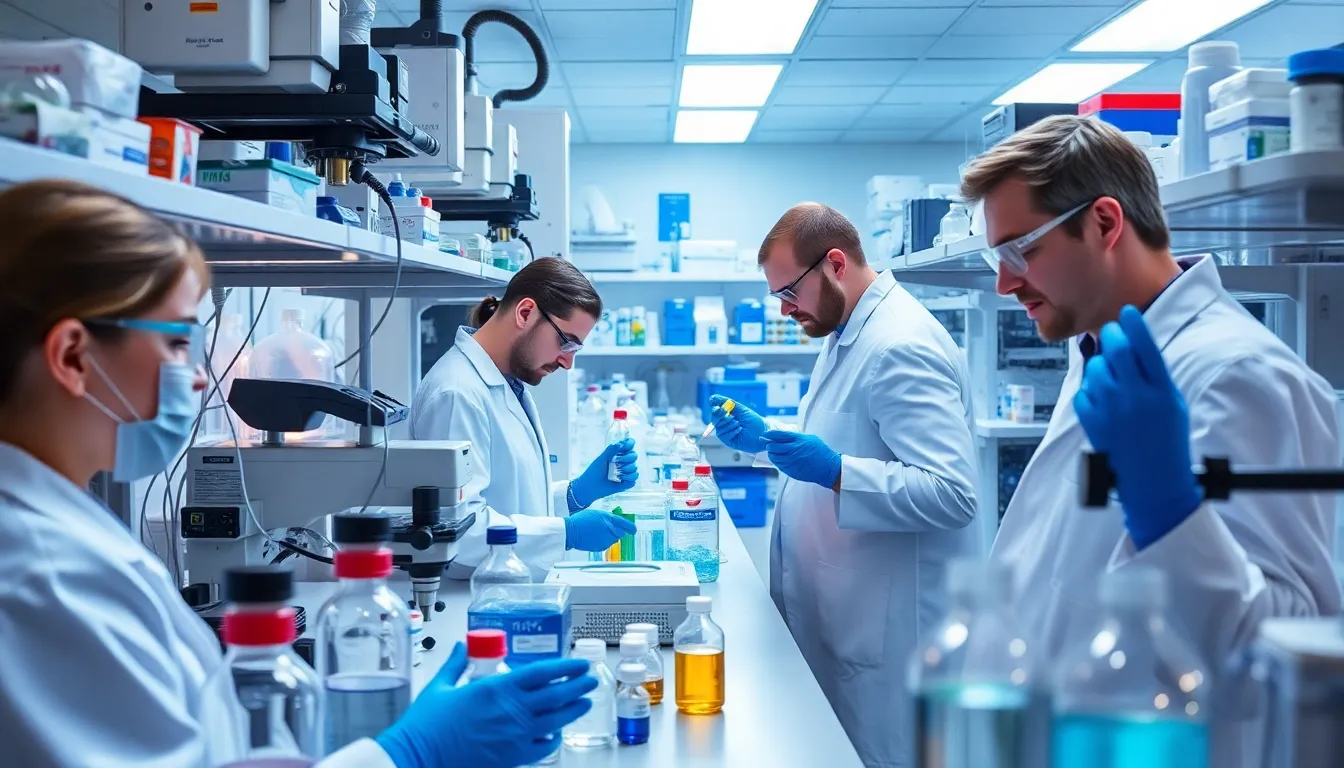Table of Contents
ToggleBoston isn’t just known for its baked beans and wicked good accents; it’s also a hotbed for biotech innovation. Nestled along the Charles River, this city is a playground for scientists and entrepreneurs alike, where groundbreaking ideas take shape faster than you can say “cell culture.” With a thriving ecosystem of biotech companies, Boston is the place where science fiction becomes science fact.
From cutting-edge gene therapies to revolutionary drug discoveries, these companies are on a mission to change the world—one petri dish at a time. If you’re curious about the minds behind the next big breakthrough in healthcare, buckle up. This article dives into the vibrant biotech scene in Boston, showcasing the companies that are not just pushing the envelope but are rewriting the entire playbook. Get ready to explore a world where innovation meets ambition, and the future of medicine is being crafted today.
Overview of Biotech Companies in Boston
Boston’s biotech landscape features over 1,000 companies, making it a global leader in the industry. Notable firms include Biogen, Vertex Pharmaceuticals, and Moderna, which are at the forefront of developing innovative therapies. Focused on areas such as genetic engineering, immunotherapy, and personalized medicine, these companies drive significant advancements.
Collaboration thrives within partnerships between biotech firms, academic institutions, and research hospitals, enhancing innovation and discovery. Institutions like Harvard and MIT contribute talent and resources, fostering an environment ripe for groundbreaking research. Networking events and incubators serve as platforms for startups and established companies, facilitating knowledge exchange and collaboration.
Recent statistics indicate Massachusetts ranks first in biotech job growth, highlighting the demand for skilled professionals. The state accounts for about 30% of the nation’s biotech employment. Funding opportunities abound, with venture capitalists and government grants supporting cutting-edge research. In 2021 alone, Boston-based biotech companies raised over $7 billion in venture capital, a clear indication of investor confidence.
Emerging companies are also making their mark, with several focusing on rare diseases and novel drug delivery systems. These startups play a crucial role in the local economy and healthcare transformations. Many are located in the bustling neighborhood of Kendall Square, recognized as the most innovative square mile on the planet.
Overall, Boston stands as a vital hub for biotechnology, continuously attracting talent and investment. The city’s strong infrastructure supports the rapid translation of scientific discoveries into real-world applications, proving crucial for future health advancements.
Major Players in the Boston Biotech Scene

Boston hosts a dynamic array of biotech firms. Established companies drive significant advancements in healthcare.
Established Companies
Biogen leads with a focus on neurological diseases. Vertex Pharmaceuticals specializes in cystic fibrosis therapies. Moderna captured global attention with its mRNA technology. Other influential firms include Amgen, known for biologic therapies, and Takeda, which invests heavily in rare diseases. Collectively, these companies bolster the region’s innovation and employment, contributing significantly to Massachusetts’ 30% share of national biotech jobs. They also attracted over $7 billion in venture capital in 2021, underscoring their financial strength and commitment to research.
Emerging Startups
Numerous startups are emerging in Boston’s biotech landscape. Companies like DTx Pharma focus on novel drug delivery systems. Allena Pharmaceuticals targets rare metabolic disorders through innovative treatments. Another example includes Squeezed, which develops next-generation therapies for prevalent diseases. These new firms nurture collaboration with local academic institutions. By leveraging Boston’s robust funding ecosystem, they thrive in an environment ripe for breakthrough discoveries, further propelling the city’s reputation as a leading biotech hub.
Categories of Biotech Companies
Boston’s biotech ecosystem consists of various categories that contribute to its innovative landscape. Each category plays a vital role in advancing healthcare and technology.
Therapeutics
Therapeutics companies focus on developing new treatments for diseases and medical conditions. Biogen specializes in therapies that target neurological disorders, providing solutions for patients with conditions like multiple sclerosis. Vertex Pharmaceuticals dedicates itself to cystic fibrosis, revolutionizing care with breakthrough therapies. Other firms such as Moderna concentrate on mRNA technology, enabling rapid vaccine development and advancing precision medicine. Collaborations within this sector often lead to innovative approaches for treating various ailments, ensuring continual progress and improved patient outcomes.
Diagnostics
Diagnostics companies create tools for identifying diseases and monitoring patient health. The focus often lies on developing accurate testing methods that enhance early detection, crucial for effective treatment. Rapid advances in genetic testing, led by companies in Boston, allow for personalized medicine tailored to individual responses. Firms such as Foundation Medicine provide genomic profiling to guide cancer therapies, significantly contributing to precision oncology. Accurate diagnostics streamline treatment protocols, ensuring better overall patient management and improved health outcomes.
Research Tools and Technologies
Research tools and technologies encompass companies developing equipment and software to aid scientific research. Boston is home to firms specializing in laboratory instruments, data analysis software, and bioprocessing technologies. These tools support researchers in their quest to discover new treatments and therapies. For example, Thermo Fisher Scientific provides an extensive range of laboratory equipment essential for various research applications. Innovation in this category drives scientific advancement, facilitating breakthroughs in biotechnology and enhancing overall research capabilities.
Funding and Investment Landscape
Boston’s biotech sector benefits from a robust funding and investment landscape that propels innovation and growth.
Venture Capital Activity
Venture capital activity remains significant in Boston, with companies raising over $7 billion in 2021 alone. Notable firms like Biogen and Vertex Pharmaceuticals attract substantial investments due to their cutting-edge research and development initiatives. Emerging startups also see considerable venture capital influx, reflecting investor confidence in their potential. Capital availability enhances the city’s reputation as a prime location for biotech innovation, driving the establishment of novel therapies and technologies. This dynamic funding environment fosters an atmosphere where innovative ideas can thrive and reach commercialization.
Government Grants and Support
Government grants and support play a vital role in the biotech ecosystem. The Massachusetts Life Sciences Center supports initiatives that improve research and workforce training through funding opportunities. Federal grants from agencies like the National Institutes of Health bolster biotech efforts for breakthrough discoveries. Local policies promote collaboration between startups and established companies, enhancing resource access and reducing barriers to entry. Government-backed initiatives ensure that Boston remains at the forefront of biotech advancements, benefiting both local and national health outcomes.
Challenges Faced by Biotech Companies
Biotech companies in Boston encounter various challenges that impact their growth and innovation.
Regulatory Hurdles
Navigating the regulatory landscape presents a significant challenge for biotech companies. Compliance with stringent regulations from agencies like the FDA is essential for product development. Companies must secure approvals for clinical trials, which often leads to delays in bringing new therapies to market. Uncertainty in regulatory pathways can complicate planning for research and development initiatives. Meeting these standards demands considerable time and resources, placing additional strain on smaller startups. Organizations need to fully understand regulatory expectations to minimize risks and ensure successful outcomes.
Competition and Market Saturation
Intense competition characterizes the Boston biotech ecosystem. Numerous firms strive to innovate, leading to market saturation in specific therapeutic areas. Companies must differentiate themselves through unique technologies or targeted solutions to stand out. This influx of new entrants heightens the pressure on established firms to continually innovate. Additionally, maintaining a strong pipeline of products is crucial for survival in a crowded market. Companies face challenges in securing investments while balancing the need for innovation with the realities of competition.
Future Trends in Boston’s Biotech Industry
Emerging trends suggest that Boston’s biotech industry will see significant advancements in personalized medicine. Companies are prioritizing genetic testing, leading to tailored therapies that address individual patient needs. mRNA technology continues to evolve, with several firms exploring its potential beyond vaccines, including treatments for various diseases.
Investments in digital health technologies are also surging, reflecting an increasing interest in telehealth and wearable devices. Startups are innovating rapidly in this area, aiming to enhance patient monitoring and adherence to treatments. Collaboration between biotech firms and tech companies encourages the integration of artificial intelligence into drug discovery, streamlining research processes and reducing timeframes for bringing new therapies to market.
Boston’s geographical concentration of talent fuels the pipeline of biotech professionals. Educational institutions, like Harvard and MIT, expand their biotech programs to meet the industry’s demands, preparing graduates with the necessary skills to advance research and development efforts. Furthermore, networking opportunities strengthen collaborations between established companies and startups, fostering an environment conducive to innovation.
Government initiatives are expected to support the growth of the sector. The Massachusetts Life Sciences Center continues to offer funding and resources to new ventures, reinforcing Boston’s position as a leading biotech hub. As competition intensifies, companies will focus on differentiation by developing unique technologies or niche solutions, ensuring they stand out in a crowded marketplace.
Sustainability trends are influencing biotech practices as well. Firms are beginning to prioritize environmentally friendly production methods and sustainable sourcing, aligning their goals with broader societal expectations. This focus on sustainability not only improves company reputations but also resonates with investors prioritizing responsible investments.
Overall, the future of Boston’s biotech industry appears bright, driven by innovation, collaboration, and a commitment to improving healthcare outcomes.
Boston’s biotech landscape stands as a testament to innovation and collaboration. With its diverse array of companies pushing the boundaries of science and technology, the city continues to attract talent and investment. The synergy between established firms and emerging startups fosters a dynamic environment that promotes groundbreaking advancements in healthcare.
While challenges exist, such as regulatory hurdles and intense competition, Boston’s commitment to research and development ensures that it remains a leader in the biotech sector. As the industry evolves, the focus on personalized medicine and sustainable practices will likely shape the future of healthcare, benefiting not only the local community but also the global population.



